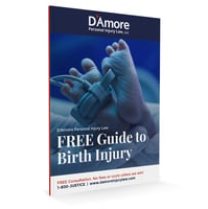D'Amore Personal Injury Law, LLC
Serious Injury Lawyers Proudly Serving
Baltimore, Annapolis, & Washington, D.C.
Preterm Labor Negligence
What is Preterm Labor Negligence?
Labor is the beginning of the delivery process, and if it begins too soon, there are risks for the baby, who is underdeveloped. Preterm labor involves regular contractions that cause the cervix to open between weeks 20 and 37 of the pregnancy. Doctors who oversee the process of preterm labor must carefully monitor the situation and provide the best care. Preterm labor negligence by doctors or other medical professionals can lead to potential complications and dangers for the mother or baby.
What happens in preterm labor negligence?
The earlier that premature birth happens, the more risks for the premature baby, often called a “preemie.” Medical professionals must provide special attention to care for the unique needs of the preemie, and the possibility of long-term complications, both mental and physical, is present with many premature deliveries.

What are some symptoms of Preterm Labor Negligence
Things to watch for between weeks 20 and 37 are physical symptoms such as:
- A persistent feeling of pelvic or low abdominal pressure
- An ongoing, dull backache
- Frequent or reoccurring sensations of abdominal tightening that go with contractions
- Spotting or slight bleeding in the vaginal area
- Abdominal cramps
- Change in nature of vaginal discharge to mucus-like, watery, or bloody
- Rupture of membranes with a trickle or heavy flow of fluid from the breaking of the membrane surrounding the baby
You should consult with your doctor about any of these symptoms. It is better to mistake “false labor” for preterm labor and get a checkup than to risk potential complications from preterm labor.
What are some likely outcomes following Preterm Labor Negligence?
Preterm labor creates a risk of delivery of a preterm baby who may be at risk for health complications due to a lack of development of critical organs and bodily systems. Some problems might include low birth weight, vision difficulties, breathing challenges, and improperly developed organs. In addition, premature babies have a greater risk of learning disabilities, behavioral challenges, and cerebral palsy. If the doctors working on the case make critical errors or misjudgments, a problematic situation can worsen.
Preventing Preterm Labor Negligence
Doctors and patients cannot always avoid preterm labor. It may relate to genetic or other factors you don’t have control over.
There are ways to improve your odds of carrying your baby to a full-term healthy, happy delivery. Some best practices include having ongoing prenatal care and following all the advice of your doctors and nurses. Talk openly about your concerns and any symptoms you may be having that may concern you. A nutritious and complete diet is essential during pregnancy. Talk to your healthcare providers and nutritionist experts about the best diet for you and your needs.
Stay clear of dangerous substances that can affect your baby’s development. Avoid alcohol, smoking, and any drugs that aren’t part of your approved health regimen from your doctor.
Learn more about what to do after a Birth Injury in our FREE guide.

RELATED ARTICLES
FREE Case Consultation
Fill out the form below and we will contact you.
Or, give us a call at
